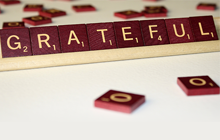In light of the previous discussion concerning Christianity’s relationship to these concepts, should Christians be trying to redefine what it means to be successful and to achieve the American dream? Students of American history quickly discover that for many years most Americans pursued something called “the American Dream.” Definitions of this dream differ, but the reality of its motivation is clearly present during times of great economic growth in our nation. Does this dream still exist? Is it still motivating the average American? Does it drive us toward the best goals? In the following article Makoto Fujimura considers the current state of the American Dream.
Makoto Fujimura is an artist, writer, and speaker who is recognized worldwide as a cultural shaper. A Presidential appointee to the National Council on the Arts from 2003-2009, Fujimura served as an international advocate for the arts, speaking with decision makers and advising governmental policies on the arts. (Source)
Ground Zero and the American Dream
by Makoto Fujimura | Ten years ago, I was trapped in the number 3 subway underneath the Chambers Street Station as the horrific events of 9/11 took place above me. I was trying to get home after organizing a prayer meeting for People Involved in the Arts in a building on the Westside. By the time the subway back-tracked to 14th St., 45 minutes later, the towers were gone.
My wife had just dropped off our two youngest children at PS 234 only two blocks from the towers. It was their first day of school. As I ran back toward home, brushing against business folks covered in the white ashes, I realized that our loft may not be standing. Instead, I decided to go to my studio below Canal St, ten blocks from the towers, where my wife, thankfully, left a telephone message saying that the children had been evacuated safely, and that she would meet me at the studio.
We were allowed to return to our loft, after being exiled for two months, for Thanksgiving of 2001. The stubborn fire that persisted throughout that time at Ground Zero finally went out around Christmas, and our children were able to return to their school building in February of 2002. By that time, Ground Zero was no longer Ground Zero.
No longer a raw, devastating and severe reality, Ground Zero had quickly become sanitized. Cheap trinkets were sold and American flags were waved for all sorts of ideologies. Tourists flocked to the site after the Canal Street entrance was opened. It became the flash point for demonstrations surrounding everything from wars to Islam to American destiny.
Has the concept of the “American Dream” changed since the events of September 11, 2001?
The American Dream: a term coined by historian James Truslow Adams in 1931, meaning “life should be better and richer and fuller for everyone, with opportunity for each according to ability or achievement.” Each generation, until recently, passed on a higher expectation for the next generation to follow. I suspect each journey toward the American Dream is also a re-fictioning, or at least a re-telling, of personal narratives. Just as Ground Zero became co-opted, the American Dream can very quickly be short-changed into sheer materialism. Whatever the “American Dream” can mean, it is true that each generation may have its own version.
Today, the “American Dream” can be liquid, and certainly elusive, but the incarnation of these ideals can morph and still fit the original definition.
What did 9/11 end, and what did it begin? 9/11 exposed the assumptions behind terms like “Ground Zero” or “American Dream.” For that we need to be grateful. For me, the past decade was an opportunity to think through the consequences of these assumptions. These two terms can be connected in such a reflection.
Theologically, the whole of earth is “Ground Zero.” We live in the fallen world in which every good, true, and beautiful reality is quickly idolized to something selfish, greedy and destructive. Christians believe that Christ came to redeem this path to self-destruction by taking on all of our “pride of the flesh” on the Cross.
“Ground Zero,” in Christ, can also mean a cancellation point, a new beginning where we can stand on the ashes of the Wasteland we see and still seek renewal and “genesis moments.”
The “American Dream” can be a collection of such “genesis moments.” The American Dream does not have to be merely a calculus of how many material possessions we can accumulate; it can be a measurement of happiness based on creative and relational capital. Rather than the blind drive to advance into all the areas of this fragile earth, we can purpose to care for her, as Creation Care advocates have noted. Rather than making Darwinian decisions on “limited resources,” we can endeavor to believe that God’s resources, especially the creative and relational capitals, are infinite. Creativity based on love can create a capital of generosity, feeding the world with fresh opportunities rather than fostering competition.
Caring for culture (or Culture Care) at large, just as we have begun to do for our environment, is a noble goal for the next generation. This does not have to be a socialistic vision, by the way, which is based on limited resources, but can be based on the abundant optimism of what “America” represents.
In other words, the “American Dream” does not have to be all about the houses and boats we own, but it can be about the celebration of the prudential and humble steps to steward the infinite grace we receive. It can become truly about the dreams of an individual, just as Adams defined the term the “American Dream.” We can see possibilities even as we grieve, standing on the ashes of Ground Zero, and as we endeavor to pass on hope to future generations.
This will require faith. And one does not even need to be an American to be part of that dream. The American Dream is no longer bound by geography, what passport we carry, or what political parties we belong to. A Dream is always meant to be open-sourced, imparted as a gift to those who dare to take on the challenge. Yes, America is a place, a locality. As such, America can be a ferment of experimentation: a place where new ideas can be tried out, tested in the microcosm of that locality, and shared. It can be a nexus of the creative and communal movement of dreamers, gathered to steward the future of the world.
Now, of course, immediate suspicion will challenge such an optimistic view. The world, certainly, does not operate out of generosity, but individual preservation and even greed. Capitalism depends on this drive. From the faith communities of churches, I can hear dissent as well. Are we meant to be triumphant over the city of men on this side of eternity? And if we are, are we not simply able to push back the darkness for a limited time before corruption sets within us? Are we not simply trying our best to be a force of resistance to the evils of our days until Christ returns? All of these positions are valid.
Yet, I submit here a radical thought rising from the ashes of 9/11 and the subsequent financial crisis on Wall Street: capitalism based on only greed is not sustainable, and faith without audacity cannot survive in our extreme climate of pluralism.
Like Saint Francis and Saint Clare of Assisi, we can begin our journey with a position of humility, and radical, audacious faith. We can journey on the winding path upward, praying with the birds’ trills calling each other through the tree branches of pluralism. A community that depends on material capital will only grow with the territorial battles. A community that depends on creative faith and communal vision will thrive even if the whole system of the world, or even the corrupt church of St. Francis’ times, is set against it. Even the financial, political, and military “gates of hell” shall not prevail against it.










